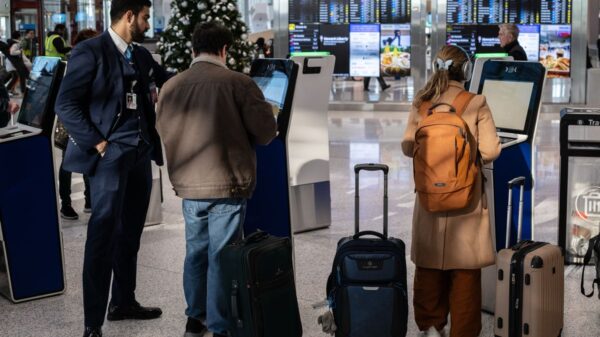A powerbank explosion in the Qantas business lounge at Melbourne Airport on Thursday caused widespread panic and led to the evacuation of approximately 150 people. The incident occurred at around 11 a.m. when a portable charger ignited in a man’s pocket, resulting in flames engulfing his jacket.
Witnesses described a scene of chaos as screams filled the lounge following the explosion. According to reports from The Sydney Morning Herald, battery acid sprayed across the area, prompting airport staff to swiftly assist the burning passenger and evacuate the lounge. The man, believed to be in his 50s, sustained burns to his leg and fingers.
One traveler, who shared their experience on social media, noted the intensity of the smoke and the strong smell resulting from the fire. “His jacket caught on fire. They evacuated us because the smoke and smell was so strong, but I really just hope the guy is okay,” the traveler stated, alongside a photo of the damaged powerbank.
Emergency Response and Aftermath
Film producer Leanne Tonkes, who was present during the incident, praised the quick response from both bystanders and staff. “Quick thinking from the man who jumped in to help and the staff who got him in the shower and everyone else out of the lounge,” she wrote on Instagram. Paramedics transported the victim to The Alfred hospital, where he was reported to be in stable condition after receiving treatment at the scene.
This incident has prompted Qantas to review its policies regarding lithium battery restrictions. In a related context, Virgin Australia announced similar safety measures following a separate powerbank fire that occurred in an overhead compartment during a flight from Sydney to Hobart in July.
The incident highlights growing concerns about battery-related fires in aviation. Airlines globally are under increasing pressure to implement stricter regulations regarding the transport of lithium batteries. For instance, Emirates recently banned powerbank use across its fleet of 266 aircraft, restricting passengers to only one device each. Additionally, South Korea instituted nationwide restrictions in March after a January incident involving an Air Busan flight that resulted in injuries to 27 people.
According to the International Air Transport Association, a significant number of passengers mistakenly believe that carrying lithium devices in checked luggage poses no risk. This misconception underscores the need for heightened awareness and regulation in the industry.
As of the time of publication, attempts to reach Melbourne Airport for further comment have not yielded a response. The circumstances surrounding this incident serve as a critical reminder of the potential hazards associated with lithium batteries in travel environments.








































































